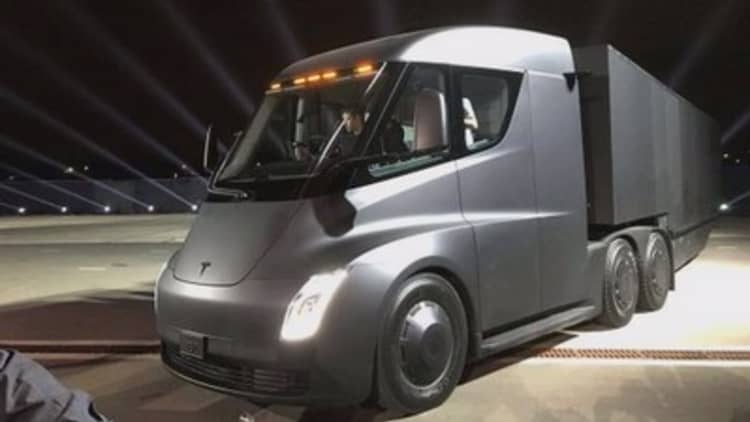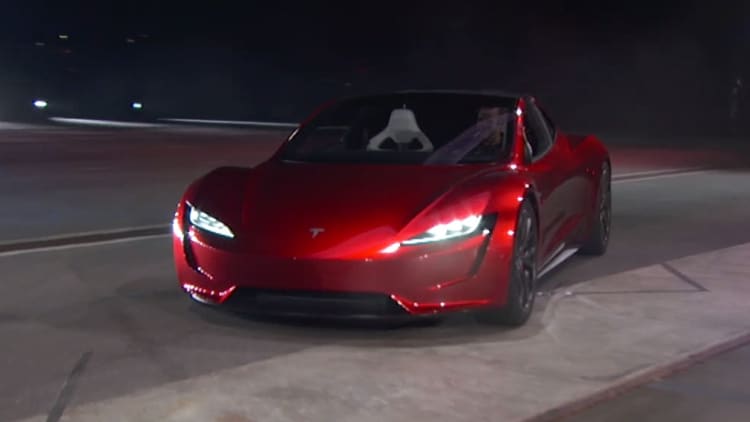
Electric trucks could sell faster than cars, but Tesla may be aiming at the wrong end of the heavy-duty truck market, says a new report.
Mounting regulatory pressure and future policy changes may push freight carriers to adopt lower-emission power trains in their vehicles, said Barclays analyst Michael Cohen in a note sent Monday.
But Tesla's recently unveiled semitrailer might be aimed at the segment of the market that will likely be the slowest to transition to electric drivetrains. Constraints on price, range and payload capacity suggest the long-haul market may be the last to embrace electric trucks, after urban freight and other shorter-range, lighter-duty vehicle markets.
Overall, heavy-duty trucks are big polluters. Though they only make up 10 percent of all vehicles on the road and 20 percent of all miles driven, freight trucks emit about 40 percent of all vehicle emissions, Cohen said. This makes the sector difficult to ignore for politicians seeking to reduce emissions.
Indeed, more than 200 cities have some kind of emissions regulation, and major cities such as Madrid, Paris, London and Mexico City have already announced bans on diesel engines, which could rapidly accelerate interest in electrics, Cohen said.
Also, U.S. regulations are set to improve fuel efficiency for tractors by 25 percent through 2027. Starting in 2019, China will begin tightening fuel consumption limits for heavy-duty trucks by almost 15 percent. The European Union plans to develop a carbon dioxide standard for heavy-duty vehicles in the first half of 2018.
All of these are signs that policy changes may matter more in the adoption of electric vehicles in freight than they will in the widespread adoption of electric cars.
"In our view, greater attention should be paid to developments in the freight sector than to those in the personal vehicle sector, for two reasons: policy could drive the adoption tipping point for freight vehicles more quickly than for personal vehicles, and the total cost of ownership and a faster turnover rate could drive freight truck fleet owners to adopt EVs more quickly than passenger vehicle owners," Cohen said.
Tesla's own entry "creates much optimism for EV adoption," Cohen said, "but displacing oil in long-haul trucking has the most daunting cost and technological challenges of all segments. Due to weight and range constraints, EVs will likely enter the light/medium weight and urban/regional markets first, and the heavy, long-haul sector (including semi trucks) last."
Some other companies in this area are focusing on these other markets, fitting electric motors and batteries into garbage trucks and city buses, rather than long-haul trucks.
Industry veteran and Tesla co-founder Ian Wright told CNBC long-haul trucking is a tougher market for electric than shorter-range, light- and medium-duty trucking.
"I was a little surprised they were targeting long-haul trucks, because that is the worst thing you can do with a battery electric [vehicle]," Wright said. Wright is now founder and CEO of Wrightspeed, a company that makes very low-emission power trains that blend electric motors and batteries with a small, highly efficient diesel generator.
Tesla was not immediately available for comment.
One of the problems with using electric for longer range is that as range climbs, so does the size of the battery. This in turn increases the truck's weight and lessens the amount of cargo the truck can handle.
Wrightspeed's own customers tend to operate fleets of lighter, smaller trucks that work more on a local level. For example, the company has made powertrains for FedEx and for garbage trucks in at least two counties in northern California.
Tesla did not disclose the total weight of its truck, which is a key piece of information, said Stifel analyst Michael Baudendistel in a note sent Sunday.
"Disclosing the vehicle range without the weight really tells us very little," Baudendistel said. "We think it is reasonable to believe there may be a 10,000-pound battery pack in the Tesla tractor with a 500-mile range, or a 700 kWh battery pack."
While removing the diesel engine could go some way to offsetting battery weight, "a battery pack of that size would almost certainly cut into the payload capacity of the truck," he said.
WATCH: Tesla just threw in a major surprise at the semi truck unveiling: a revamped Roadster



